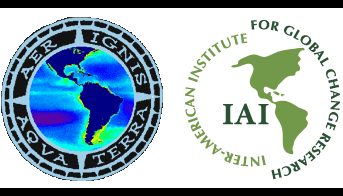ASSESSMENT OF MARINE ECOSYSTEM SERVICES AT THE LATIN- AMERICAN ANTARES TIME-SERIES NETWORK.
Project funded by the Inter-American Institute for Global Change Research CNR-3094 (2013-2017).
Marine ecosystem services (ES) such as fisheries? support and carbon sequestration undeniably contribute to human well-being and they are being affected by changes in the climate system. Human activities influence climate through the use of fossil fuels and reduce biodiversity by selectively extracting/exploiting species and drastically changing their habitats. Proper management of natural resource stocks and services and of human impacts on them is essential to promote human well-being. Defining proper management strategies requires monitoring the changes that are occurring in the environment and their impact on society. The Group of Earth Observations (GEO) coordinates international Earth observation programs, with the final goal of making the data easily available to decision makers. The ocean is still under-represented, however, even at this high inter-governmental level. Initiatives that have already been undertaken to protect natural ocean resources include the development of an ecosystem approach to fisheries management (Pauly, 2005) and the assessment of the state of health of the ocean (Halpern et al., 2012). More specifically, the ocean offers many key ecosystem services and thus it can be regarded as a ?global common? (Buck, 1998). Among them, phytoplankton (microscopic autotrophic organisms) provide essential services categorized as: regulating -since their role fixating atmospheric CO2 and its eventual burial in deep waters represents a significant part of the global carbon cycle and hence influences climate trends-, and supporting -since through the photosynthesis process and nutrient cycling they support goods and services used by humans (including 50% of the oxygen we breathe). Making the necessary observations to monitor the state of phytoplankton and the oceanographic environment is difficult and expensive; hence marine time-series studies are relatively rare. Here we propose to integrate data on phytoplankton and oceanographic variables regulating their growth collected at eight time-series stations around Latin America (Argentina, Brazil, Chile, Colombia, Ecuador, Peru, Mexico and Venezuela), which constitute the Antares network (www.antares.ws). Historical in situ observations from each time-series station (starting in 1995 for the oldest and 2008 for the youngest) together with remote sensing information will be used to investigate the state and trend of changes in phytoplankton populations and the oceanographic environment. These studies will be complemented by modeling tasks aimed at understanding the functioning of the different local systems, including how they are connected at a regional scale. The Antares network integrates a variety of natural environments and socio-economic conditions among the eight participating Latin American countries. Thus, we propose a multidisciplinary approach to understand the impact that changes in the ocean may have especially in the regulating and supporting ecosystem services provided by phytoplankton and to investigate the connection of these ES with the human populations in the coastal areas of the Antares sites (primary stakeholders). As to the method, a channel for dialogue and information sharing with stakeholders will be created from the outset in order to identify key questions and information gaps. In this context a basic set of natural/ socioeconomic vulnerability indicators and trends will be presented and discussed. As a second step, the project will define new methodologies and develop a set of socioecological variables and indicators to assess the phytoplankton ES and, subsequently, of environmental health. In addition, specific case studies will be developed to analyze possible changes in the natural (local and regional biogeochemical models to obtain information on changes in phytoplankton) and socioeconomic effects (e.g., fisheries, carbon uptake) of the identified trends. A strategy for effective communication of the knowledge co-constructed during the project will be developed to facilitate dialogue and awareness raising efforts with local decision makers as well as further outreach and research activities for the protection of these ocean ecosystem services for human well being.

